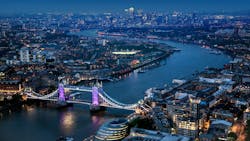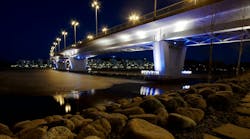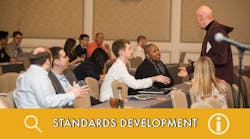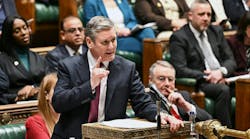A technology committee from Parliament’s upper house continues to press for a national policy on light pollution in the U.K. In its latest move, it rebuked the Government for rejecting earlier recommendations, while also insisting on reconsideration.
In a July report on light and noise pollution, the House of Lords Science and Technology Committee noted that “light and noise pollution are currently neglected pollutants, but research indicates that they are causing significant health impacts and they are of growing concern to the public.”
The report, titled "The neglected pollutants: the effects of artificial light and noise on human health," said that “the Government should issue a Light Policy Statement for England which details the Government’s policy on minimising light pollution and the roles it expects different departments to play.”
The committee sent the report to the Government, in hopes of a policy including detailed and national research on light pollution.
(Editor’s note: The "Government" in the U.K. refers to what U.S. readers might think of as the executive branch; in Britain’s parliamentary system the Executive, including the Prime Minister and the Cabinet, are part of Parliament.)
But the committee, led by Baroness Brown of Cambridge, was disappointed by a Dec. 1 response from the Government, which it regarded as a rejection of its recommendations.
This week, the committee wrote to Rebecca Pow, the Minister for Nature in the Government’s Department for Environment, Food and Rural Affairs (DEFRA).
“Our inquiry was wide-ranging and made recommendations on light and noise pollution, both in terms of further research that could be conducted, and in terms of policy interventions that could address these risks to both the physical and mental health of the public,” the committee stated. “We believe that there are valuable public health interventions that could be made which would improve the quality of life for citizens and reduce pressures on the NHS.” (The NHS is Britain’s National Health Service).
The letter summarizes the public health hazards of noise pollution, and then gives equal time to light pollution, citing, among other concerns, the disruption to circadian rhythms. LEDs Magazine has written extensively about the possibilities of tuning LEDs for circadian benefits, most recently on the user task-plane level and more broadly in a residential healthcare facility.
“Despite the rapid expansion of the use of artificial lighting since the advent of LEDs, our ability to assess the impacts of light pollution on health is limited,” the letter states. “This is in part because it is not measured systematically. We wish to express our concerns with the Government’s disappointing response and to urge you to reconsider the Government’s approach to policy concerning light and noise pollution in the future.”
Specifically on light pollution, the letter notes:
“We recommended the creation of a light policy statement which would set out Government policy towards light pollution and the expected roles of different departments. This would mirror the Noise Policy Statement for England. We believe it is crucial to ensuring light pollution is addressed to strengthen and clarify interdepartmental coordination on these issues….We were therefore disappointed to see the government reject this, saying ‘significant gaps in our understanding of artificial light’s effects would need to be addressed’ and that it wanted to ‘[identify] the most important knowledge gaps to prioritise the research needed to inform such a statement.’ We accept that more research is needed; we were therefore at a loss to understand that our recommendation that there should be a research programme to understand how light impacts health was also rejected.
“Furthermore, the Government rejected our key recommendation that DEFRA establish a standard methodology for tracking and reporting on light pollution so that the problem could be quantified, citing ‘technical and data issues’ that need to be resolved. The response said that “further development of the evidence base will need to be considered in the context of Government priorities.
“Taken together, the response suggests that the evidence base is not advanced enough to inform a national policy on light pollution and that the Government is unable or unwilling to develop the evidence base any further – even to develop or endorse any metric that will track whether light pollution is getting better or worse. Could you clarify whether or not the Department supports the requirement for further research in this important area in order to develop its policies and, if so, what it will be doing about this?”
The letter finishes with a call to action.
“We urge you to reconsider the response to the recommendations made in our report and highlighted in this letter,” it states. On light pollution, the committee asks, “Will the Government commit to fund further research into the effects of light pollution on human health, with a view to establishing metrics which can measure the extent and severity of light pollution in the UK? Is the Government confident that adequate resources and guidance are available for local authorities to tackle light and noise pollution, and can it commit to offering them further financial support?”
One issue facing light pollution campaigners anywhere in the world is the absence of a common methodology to measure light pollution and its health effects.
The House of Lords letter marks the second time in recent weeks that a group has called for government action on lighting-related health hazards. Last month, motoring outfit RAC took aim at dazzling headlights.
More on lighting for health and wellbeing
California Lighting Technology Center expands Color Lab research
How the industry can standardize circadian lighting
Blue-light study shows promise in healing mild TBI
MARK HALPER is a contributing editor for LEDs Magazine, and an energy, technology, and business journalist ([email protected]).
Follow our LinkedIn page for our latest news updates, contributed articles, and commentary, and our Facebook page for events announcements and more. You can also find us on the X platform.






